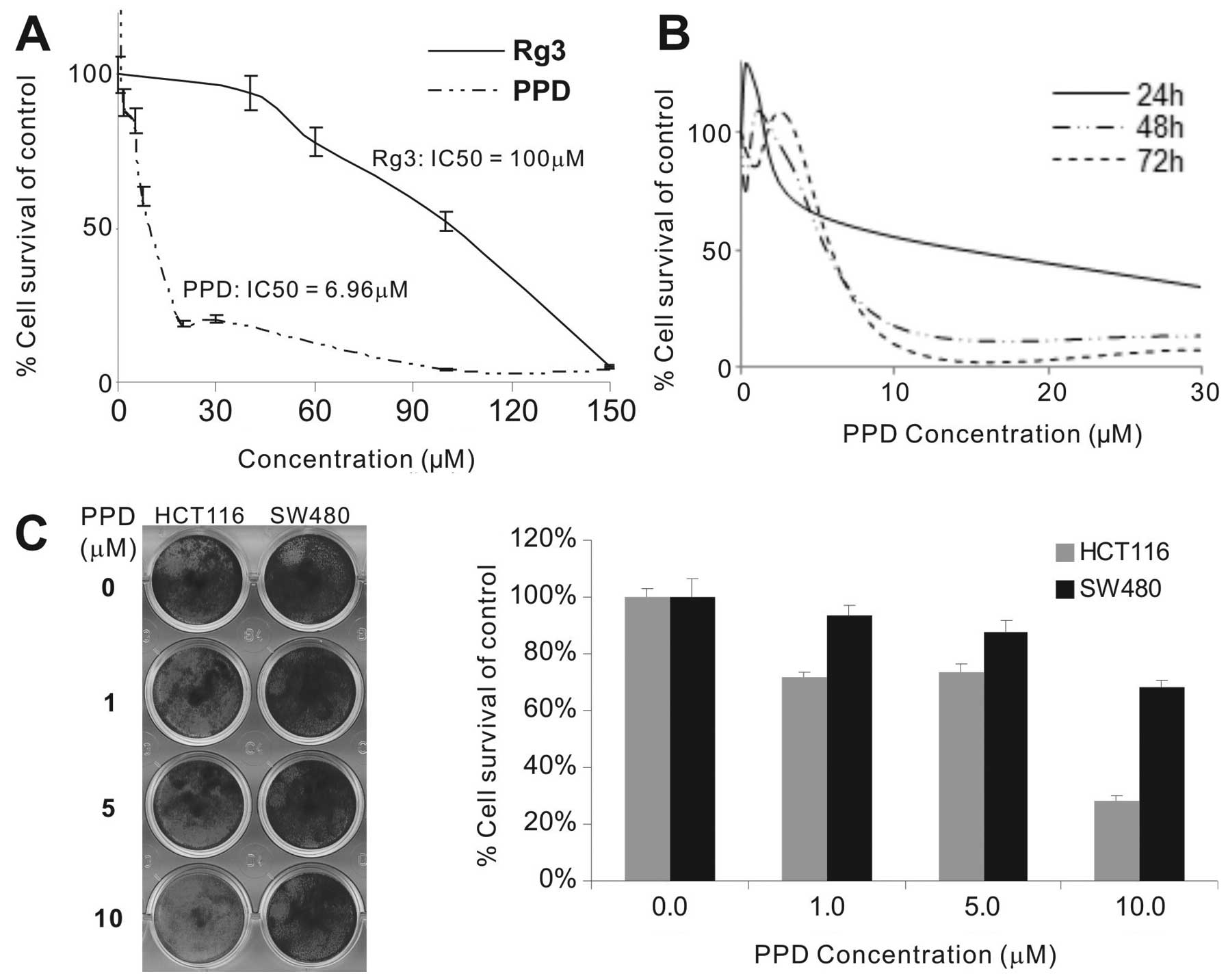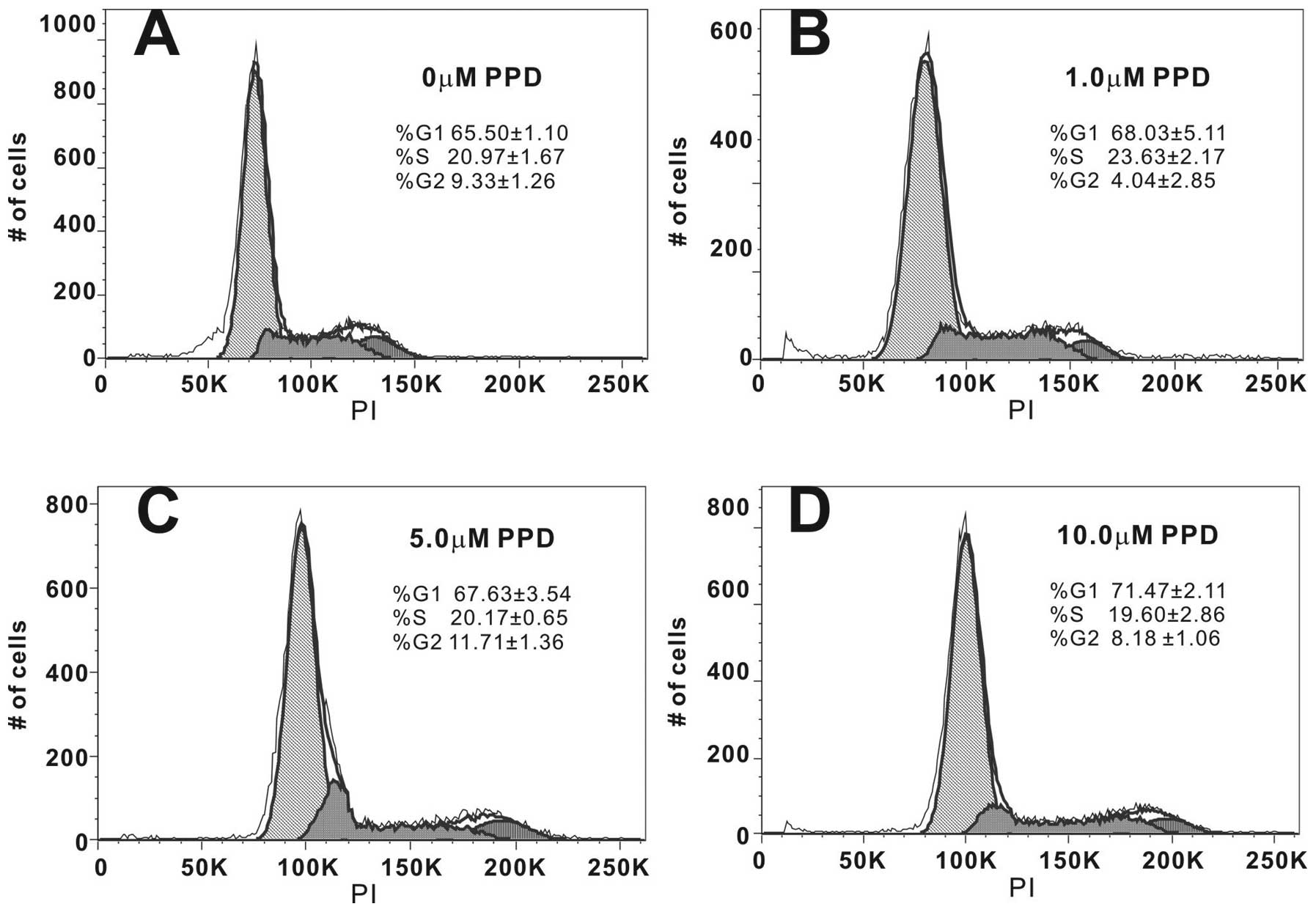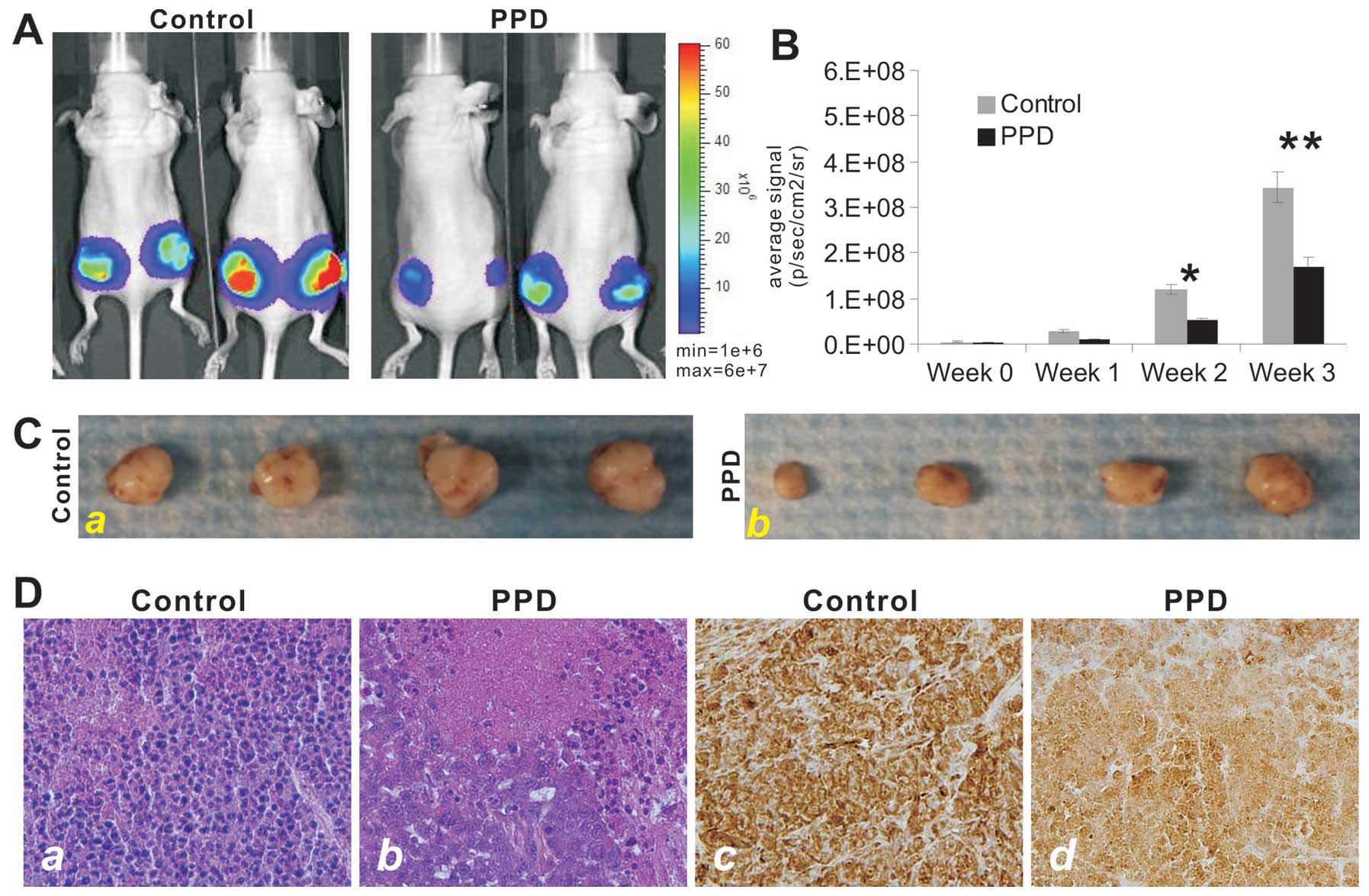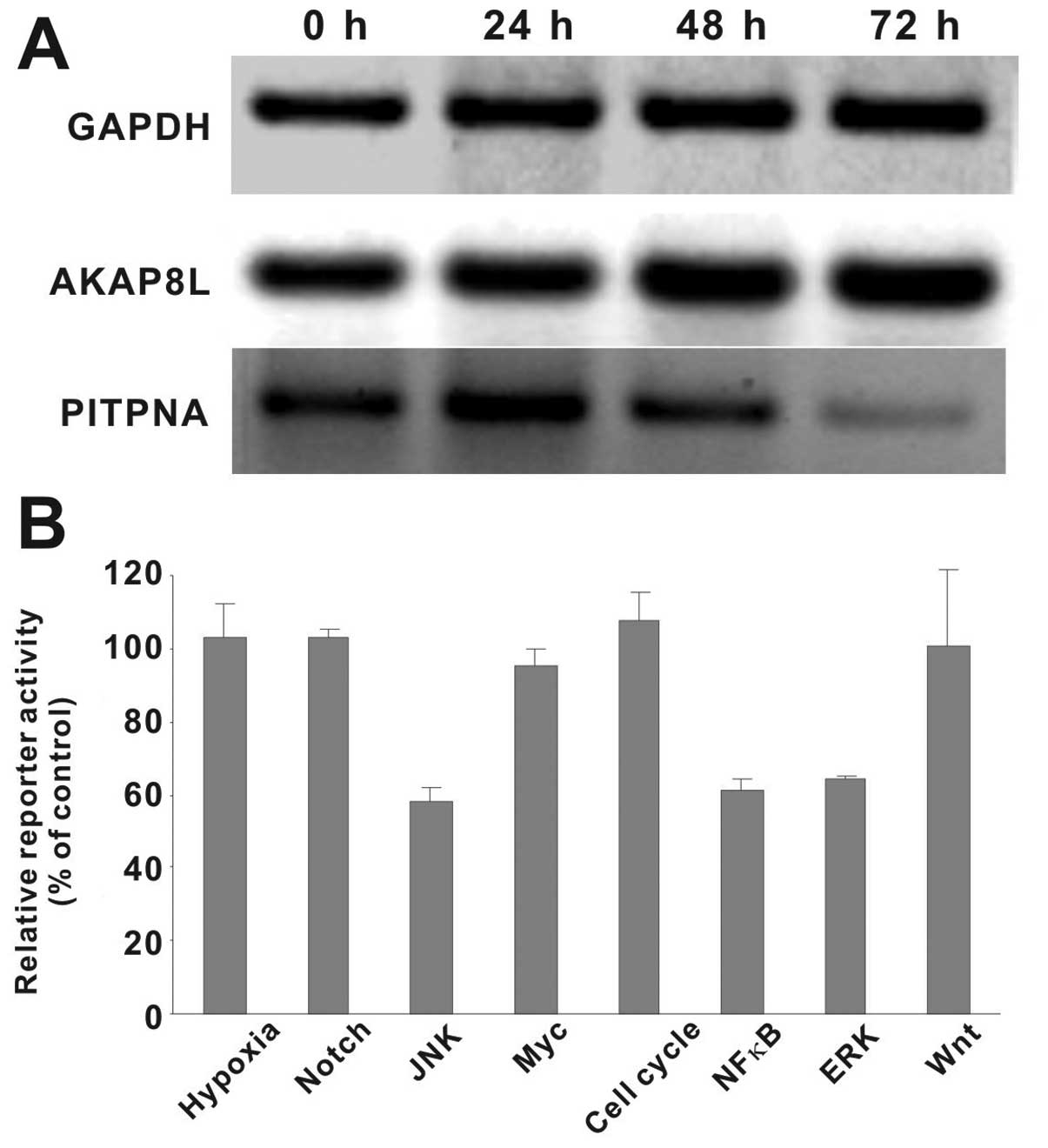|
1
|
Cragg GM, Newman DJ and Snader KM: Natural
products in drug discovery and development. J Nat Prod. 60:52–60.
1997. View Article : Google Scholar
|
|
2
|
Wang CZ and Yuan CS: Potential role of
ginseng in the treatment of colorectal cancer. Am J Chin Med.
36:1019–1028. 2008. View Article : Google Scholar : PubMed/NCBI
|
|
3
|
Wang CZ, Aung HH, Zhang B, Sun S, Li XL,
He H, Xie JT, He TC, Du W and Yuan CS: Chemopreventive effects of
heat-processed Panax quinquefolius root on human breast
cancer cells. Anticancer Res. 28:2545–2551. 2008.PubMed/NCBI
|
|
4
|
Qi LW, Wang CZ and Yuan CS: Isolation and
analysis of ginseng: advances and challenges. Nat Prod Rep.
28:467–495. 2011. View Article : Google Scholar : PubMed/NCBI
|
|
5
|
Cho SH, Chung KS, Choi JH, Kim DH and Lee
KT: Compound K, a metabolite of ginseng saponin, induces apoptosis
via caspase-8-dependent pathway in HL-60 human leukemia cells. BMC
Cancer. 9:4492009. View Article : Google Scholar : PubMed/NCBI
|
|
6
|
King MM and Murphy LL: Role of cyclin
inhibitor protein p21 in the inhibition of HCT116 human colon
cancer cell proliferation by American ginseng (Panax
quinquefolius) and its constituents. Phytomedicine. 17:261–268.
2010. View Article : Google Scholar : PubMed/NCBI
|
|
7
|
Yoo JH, Kwon HC, Kim YJ, Park JH and Yang
HO: KG-135, enriched with selected ginsenosides, inhibits the
proliferation of human prostate cancer cells in culture and
inhibits xenograft growth in athymic mice. Cancer Lett. 289:99–110.
2010. View Article : Google Scholar : PubMed/NCBI
|
|
8
|
Du GJ, Wang CZ, Zhang ZY, Wen XD, Somogyi
J, Calway T, He TC, Du W and Yuan CS: Caspase-mediated
pro-apoptotic interaction of panaxadiol and irinotecan in human
colorectal cancer cells. J Pharm Pharmacol. 64:727–734. 2012.
View Article : Google Scholar : PubMed/NCBI
|
|
9
|
Du GJ, Wang CZ, Qi LW, Zhang ZY, Calway T,
He TC, Du W and Yuan CS: The synergistic apoptotic interaction of
panaxadiol and epigallocatechin gallate in human colorectal cancer
cells. Phytother Res. 27:272–277. 2013. View Article : Google Scholar : PubMed/NCBI
|
|
10
|
Hasegawa H, Sung JH, Matsumiya S and
Uchiyama M: Main ginseng saponin metabolites formed by intestinal
bacteria. Planta Med. 62:453–457. 1996. View Article : Google Scholar : PubMed/NCBI
|
|
11
|
Xie JT, Wang CZ, Zhang B, Mehendale SR, Li
XL, Sun S, Han AH, Du W, He TC and Yuan CS: In vitro and in vivo
anticancer effects of American ginseng berry: exploring
representative compounds. Biol Pharm Bull. 32:1552–1558. 2009.
View Article : Google Scholar : PubMed/NCBI
|
|
12
|
Jung SH, Woo MS, Kim SY, Kim WK, Hyun JW,
Kim EJ, Kim DH and Kim HS: Ginseng saponin metabolite suppresses
phorbol ester-induced matrix metalloproteinase-9 expression through
inhibition of activator protein-1 and mitogen-activated protein
kinase signaling pathways in human astroglioma cells. Int J Cancer.
118:490–497. 2006. View Article : Google Scholar
|
|
13
|
Luo X, Wang CZ, Chen J, Song WX, Luo J,
Tang N, He BC, Kang Q, Wang Y, Du W, He TC and Yuan CS:
Characterization of gene expression regulated by American ginseng
and ginsenoside Rg3 in human colorectal cancer cells. Int J Oncol.
32:975–983. 2008.PubMed/NCBI
|
|
14
|
He BC, Gao JL, Luo X, Luo J, Shen J, Wang
L, Zhou Q, Wang YT, Luu HH, Haydon RC, Wang CZ, Du W, Yuan CS, He
TC and Zhang BQ: Ginsenoside Rg3 inhibits colorectal tumor growth
through the down-regulation of Wnt/β-catenin signaling. Int J
Oncol. 38:437–445. 2011.PubMed/NCBI
|
|
15
|
Wang HY, Qi LW, Wang CZ and Li P:
Bioactivity enhancement of herbal supplements by intestinal
microbiota focusing on ginsenosides. Am J Chin Med. 39:1103–1115.
2011. View Article : Google Scholar : PubMed/NCBI
|
|
16
|
Gao JL, He TC, Li YB and Wang YT: A
traditional Chinese medicine formulation consisting of Rhizoma
corydalis and Rhizoma curcumae exerts synergistic
anti-tumor activity. Oncol Rep. 22:1077–1083. 2009.PubMed/NCBI
|
|
17
|
He BC, Chen L, Zuo GW, Zhang W, Bi Y,
Huang J, Wang Y, Jiang W, Luo Q, Shi Q, Zhang BQ, Liu B, Lei X, Luo
J, Luo X, Wagner ER, Kim SH, He CJ, Hu Y, Shen J, Zhou Q, Rastegar
F, Deng ZL, Luu HH, He TC and Haydon RC: Synergistic antitumor
effect of the activated PPARgamma and retinoid receptors on human
osteosarcoma. Clin Cancer Res. 16:2235–2245. 2010. View Article : Google Scholar : PubMed/NCBI
|
|
18
|
He BC, Gao JL, Zhang BQ, Luo Q, Shi Q, Kim
SH, Huang E, Gao Y, Yang K, Wagner ER, Wang L, Tang N, Luo J, Liu
X, Li M, Bi Y, Shen J, Luther G, Hu N, Zhou Q, Luu HH, Haydon RC,
Zhao Y and He TC: Tetrandrine inhibits Wnt/β-catenin signaling and
suppresses tumor growth of human colorectal cancer. Mol Pharmacol.
79:211–219. 2011.
|
|
19
|
Su Y, Wagner ER, Luo Q, Huang J, Chen L,
He BC, Zuo GW, Shi Q, Zhang BQ, Zhu G, Bi Y, Luo J, Luo X, Kim SH,
Shen J, Rastegar F, Huang E, Gao Y, Gao JL, Yang K, Wietholt C, Li
M, Qin J, Haydon RC, He TC and Luu HH: Insulin-like growth factor
binding protein 5 suppresses tumor growth and metastasis of human
osteosarcoma. Oncogene. 30:3907–3917. 2011. View Article : Google Scholar : PubMed/NCBI
|
|
20
|
Chen L, Jiang W, Huang J, He BC, Zuo GW,
Zhang W, Luo Q, Shi Q, Zhang BQ, Wagner ER, Luo J, Tang M, Wietholt
C, Luo X, Bi Y, Su Y, Liu B, Kim SH, He CJ, Hu Y, Shen J, Rastegar
F, Huang E, Gao Y, Gao JL, Zhou JZ, Reid RR, Luu HH, Haydon RC, He
TC and Deng ZL: Insulin-like growth factor 2 (IGF-2) potentiates
BMP-9-induced osteogenic differentiation and bone formation. J Bone
Miner Res. 25:2447–2459. 2010. View
Article : Google Scholar : PubMed/NCBI
|
|
21
|
Su Y, Luo X, He BC, Wang Y, Chen L, Zuo
GW, Liu B, Bi Y, Huang J, Zhu GH, He Y, Kang Q, Luo J, Shen J, Chen
J, Jin X, Haydon RC, He TC and Luu HH: Establishment and
characterization of a new highly metastatic human osteosarcoma cell
line. Clin Exp Metastasis. 26:599–610. 2009. View Article : Google Scholar : PubMed/NCBI
|
|
22
|
Luu HH, Zhou L, Haydon RC, Deyrup AT,
Montag AG, Huo D, Heck R, Heizmann CW, Peabody TD, Simon MA and He
TC: Increased expression of S100A6 is associated with decreased
metastasis and inhibition of cell migration and anchorage
independent growth in human osteosarcoma. Cancer Lett. 229:135–148.
2005. View Article : Google Scholar : PubMed/NCBI
|
|
23
|
Vogelstein B and Kinzler KW: Cancer genes
and the pathways they control. Nat Med. 10:789–799. 2004.
View Article : Google Scholar : PubMed/NCBI
|
|
24
|
Hanahan D and Weinberg RA: Hallmarks of
cancer: the next generation. Cell. 144:646–674. 2011. View Article : Google Scholar : PubMed/NCBI
|
|
25
|
Park EJ, Zhao YZ, Kim J and Sohn DH: A
ginsenoside metabolite,
20-O-beta-D-glucopyranosyl-20(S)-protopanaxadiol, triggers
apoptosis in activated rat hepatic stellate cells via caspase-3
activation. Planta Med. 72:1250–1253. 2006.PubMed/NCBI
|
|
26
|
Li G and Wang Z, Sun Y, Liu K and Wang Z:
Ginsenoside 20(S)-protopanaxadiol inhibits the proliferation and
invasion of human fibrosarcoma HT1080 cells. Basic Clin Pharmacol
Toxicol. 98:588–592. 2006. View Article : Google Scholar : PubMed/NCBI
|
|
27
|
Zhu GY, Li YW, Tse AK, Hau DK, Leung CH,
Yu ZL and Fong WF: 20(S)-Protopanaxadiol, a metabolite of
ginsenosides, induced cell apoptosis through endoplasmic reticulum
stress in human hepatocarcinoma HepG2 cells. Eur J Pharmacol.
668:88–98. 2011. View Article : Google Scholar : PubMed/NCBI
|
|
28
|
Lee JY, Shin JW, Chun KS, Park KK, Chung
WY, Bang YJ, Sung JH and Surh YJ: Antitumor promotional effects of
a novel intestinal bacterial metabolite (IH-901) derived from the
protopanaxadiol-type ginsenosides in mouse skin. Carcinogenesis.
26:359–367. 2005. View Article : Google Scholar : PubMed/NCBI
|
|
29
|
Li N, Huang Y, Xiao W, Liu J, Li X and Li
P: Synthesis and cytotoxic activities of new fatty acid esters of
20(S)-protopanaxadiol. Z Naturforsch C. 66:199–204. 2011.
View Article : Google Scholar : PubMed/NCBI
|
|
30
|
Ming YL, Song G, Chen LH, Zheng ZZ, Chen
ZY, Ouyang GL and Tong QX: Anti-proliferation and apoptosis induced
by a novel intestinal metabolite of ginseng saponin in human
hepatocellular carcinoma cells. Cell Biol Int. 31:1265–1273. 2007.
View Article : Google Scholar : PubMed/NCBI
|
|
31
|
Kang KA, Kim YW, Kim SU, Chae S, Koh YS,
Kim HS, Choo MK, Kim DH and Hyun JW: G1 phase arrest of the cell
cycle by a ginseng metabolite, compound K, in U937 human monocytic
leukemia cells. Arch Pharm Res. 28:685–690. 2005. View Article : Google Scholar : PubMed/NCBI
|
|
32
|
Wang W, Zhao Y, Rayburn ER, Hill DL, Wang
H and Zhang R: In vitro anti-cancer activity and structure-activity
relationships of natural products isolated from fruits of Panax
ginseng. Cancer Chemother Pharmacol. 59:589–601. 2007. View Article : Google Scholar : PubMed/NCBI
|
|
33
|
Kim HS, Lee EH, Ko SR, Choi KJ, Park JH
and Im DS: Effects of ginsenosides Rg3 and Rh2 on the proliferation
of prostate cancer cells. Arch Pharm Res. 27:429–435. 2004.
View Article : Google Scholar : PubMed/NCBI
|
|
34
|
Iishi H, Tatsuta M, Baba M, Uehara H,
Nakaizumi A, Shinkai K, Akedo H, Funai H, Ishiguro S and Kitagawa
I: Inhibition by ginsenoside Rg3 of bombesin-enhanced peritoneal
metastasis of intestinal adenocarcinomas induced by azoxymethane in
Wistar rats. Clin Exp Metastasis. 15:603–611. 1997. View Article : Google Scholar : PubMed/NCBI
|
|
35
|
Jia WW, Bu X, Philips D, Yan H, Liu G,
Chen X, Bush JA and Li G: Rh2, a compound extracted from ginseng,
hypersensitizes multidrug-resistant tumor cells to chemotherapy.
Can J Physiol Pharmacol. 82:431–437. 2004. View Article : Google Scholar : PubMed/NCBI
|
|
36
|
Kim YJ, Kwon HC, Ko H, Park JH, Kim HY,
Yoo JH and Yang HO: Anti-tumor activity of the ginsenoside Rk1 in
human hepatocellular carcinoma cells through inhibition of
telomerase activity and induction of apoptosis. Biol Pharm Bull.
31:826–830. 2008. View Article : Google Scholar : PubMed/NCBI
|
|
37
|
Lee KY, Lee YH, Kim SI, Park JH and Lee
SK: Ginsenoside-Rg5 suppresses cyclin E-dependent protein kinase
activity via up-regulating p21Cip/WAF1and
down-regulating cyclin E in SK-HEP-1 cells. Anticancer Res.
17:1067–1072. 1997.PubMed/NCBI
|
|
38
|
Hu C, Song G, Zhang B, Liu Z, Chen R,
Zhang H and Hu T: Intestinal metabolite compound K of panaxoside
inhibits the growth of gastric carcinoma by augmenting apoptosis
via Bid-mediated mitochondrial pathway. J Cell Mol Med. 16:96–106.
2012. View Article : Google Scholar : PubMed/NCBI
|
|
39
|
Qi LW, Wang CZ and Yuan CS: American
ginseng: potential structure-function relationship in cancer
chemoprevention. Biochem Pharmacol. 80:947–954. 2010. View Article : Google Scholar : PubMed/NCBI
|
|
40
|
Kim SM, Lee SY, Cho JS, Son SM, Choi SS,
Yun YP, Yoo HS, Yoon do Y, Oh KW, Han SB and Hong JT: Combination
of ginsenoside Rg3 with docetaxel enhances the susceptibility of
prostate cancer cells via inhibition of NF-kappaB. Eur J Pharmacol.
631:1–9. 2010. View Article : Google Scholar : PubMed/NCBI
|
|
41
|
Choo MK, Sakurai H, Kim DH and Saiki I: A
ginseng saponin metabolite suppresses tumor necrosis
factor-α-promoted metastasis by suppressing nuclear factor-κB
signaling in murine colon cancer cells. Oncol Rep. 19:595–600.
2008.PubMed/NCBI
|
|
42
|
Popovich DG and Kitts DD: Mechanistic
studies on protopanaxadiol, Rh2, and ginseng (Panax
quinquefolius) extract induced cytotoxicity in intestinal
Caco-2 cells. J Biochem Mol Toxicol. 18:143–149. 2004. View Article : Google Scholar : PubMed/NCBI
|


















